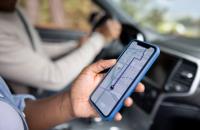
In recent years, an increasing number of Pennsylvania residents have been using rideshare services to get around the state. Unlike regular taxi services that operate on a mixture of time and distance charges, rideshares like Uber and Lyft charge their passengers a flat rate for the trip, whether they are heading to Heinz Field to take in a Steelers game or getting a ride to the airport. As a result, these can be convenient and cost-effective, giving customers the ability to book a ride right from their phones. However, like other vehicles, Uber and Lyft drivers get into car accidents, which can injure their passengers, as well as other motorists. Your ability to collect in such accidents depends on the determination of liability in a rideshare accident. This can affect the insurance coverage for your claim and will have an impact on how much your rideshare accident attorney can collect on your behalf.
How do Uber and Lyft determine whether they are liable?
Both Uber and Lyft provide insurance coverage for most accidents involving their drivers. However, a great deal depends on the circumstances surrounding whether the drivers are on duty during the time of the accident.
If you are a rider in an Uber or Lyft, then the rideshare services will consider the driver to be en route. This means that they will be able to give you the maximum insurance coverage for your claim. If you are another motorist who has an accident with an Uber or Lyft driver where he or she is on the way to pick up passengers or already has them in the vehicle, then this situation will apply as well.
A second situation is where the Uber or Lyft driver is on duty, has the applicable rideshare app on, and is waiting for a ride request. If you are a motorist who has a collision with a rideshare vehicle in this situation, then you can also make a claim against Uber or Lyft, as applicable. However, the maximum coverage will be different than if there is a passenger in the vehicle or the rideshare driver is en route to a pickup.
The third situation is the most problematic for drivers. If you have an accident with a rideshare driver who is off duty and does not have the app on, then you can only look to the personal insurance coverage for the rideshare driver. This could very well limit the amount you are able to collect for your injuries.
What are the insurance limits for Uber and Lyft?
Not surprisingly, Uber and Lyft have fairly similar insurance coverage. For Uber, if the driver has the app on but has not booked a trip, then the insurance will provide up to $50,000 per person for personal injuries, with a maximum of $100,000 per accident, as well as $25,000 in property damage coverage per accident. In addition, Uber may maintain extra coverage for such things as personal injury protection (PIP) and medical payments (MedPay). Lyft has the same limits for this situation but acts as secondary coverage, applying if the personal insurance policy of the Lyft driver does not apply or if the damage limits are exceeded.
If the rideshare driver is en route or in the middle of a trip with passengers, then the third-party auto liability insurance increases to at least $1,000,000, which covers personal injuries and damages to property. Just like the on-duty situation, Uber and Lyft may also maintain additional first-party coverage like PIP and MedPay. This coverage should be more than enough to compensate you for your injuries, whether you are a driver who has an accident with a rideshare vehicle or a passenger in an Uber or Lyft vehicle.
The problem arises when the driver is off duty. In this situation, you cannot sue the rideshare company. This limits you to only being able to file a claim against the rideshare driver’s personal insurance company. In Pennsylvania, the minimum auto insurance coverage is $15,000 per person for bodily injuries, with a maximum of $30,000 per accident and $5,000 for property damage. It is possible that the rideshare driver’s insurance may exceed these limits. However, this is significantly less than the policy limits of Uber or Lyft, which apply when the driver is on duty, regardless of whether they have booked a ride.
If you have an accident with a rideshare vehicle, it will be vital for you and your attorney to determine if the driver was on duty. If this is the case, you can go beyond the personal auto insurance of the driver to make a claim against the insurance policy for the rideshare company.
Call us today if you were involved in an accident as a passenger or another motorist with a rideshare vehicle.
Dealing with the aftermath of an auto accident is never easy. When the accident involves a rideshare driver like an Uber or Lyft, this can create additional complications. Fortunately, at The Cassidy Law Firm, our team of experienced rideshare accident attorneys will help you with your claim so that you can get the compensation that you need.